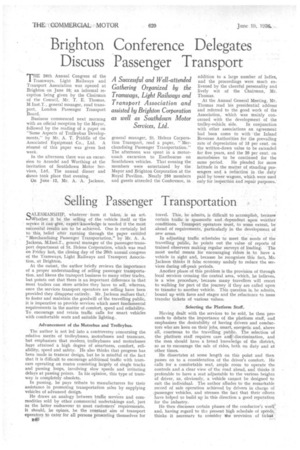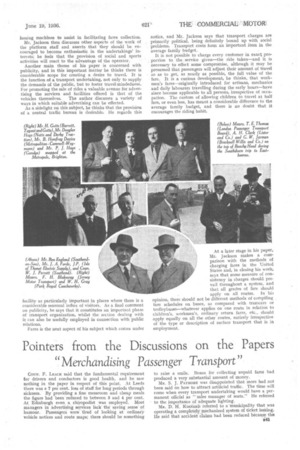Selling Passenger• Transportation
Page 50

Page 51

If you've noticed an error in this article please click here to report it so we can fix it.
SALESMANSHIP, whatever form it takes; is an art. .."Whether it be the selling of the vehicle itself or -the service it can give, expert-knowledge is needed if the most succesiful results are to be achieved. One is certainly led to this, belief after running through the paper entitled "Merchandising Passenger Transportation," by Mr. A. A. Jackson, M.Inst.T., general manager of the passenger-transport department of St. Helens Corporation, which was read on Friday last, the closing day of the 26th annual congress of the Tramways, Light Railways and Transport Associa
tion, at Brighton. • At the outset, the author briefly reviews the importance of a proper understanding of selling passenger transportation, and likens the transport business to many other trades, but points out that there is an important difference in that most traders can store articles they have to sell, whereas, once the services transport operators are selling have been provided they disappear entirely. Mr. Jackson realizes that,! to foster and maintain the goodwill of the travelling public, it is imperative to provide services which meet fundamental requirements in the matter of comfort, speed and reliability. To. encourage and retain traffic calls for smart vehicles with comfortable seats and suitable lighting..
Advancement of the Motorbus and Trolleybus.
The author is not led into a controversy concerning the relative merits of trolleybuses, motorbuses and tramcars, but emphasizes that modern trolleybuses and motorbuses ha,ye attained a high degree of smartness, comfort, reliability, speed and safety. He also thinks that progress has been made in tramcar design, but he is mindful of the fact that it is difficult to encourage additional traffic with tramcars operating on routes consisting largely of single tracks and passing loops, involving slow speeds and irritating delays at passing points. In his opinion, this type of tramway is completely obsolete.
In passing, he pays tribute to manufacturers for their assistance in promoting transportation sales by supplying vehicles of advanced design.
He draws an analogy between traffic services and commodities sold by other commercial undertakings and, just as the latter endeavour to meet customers' requirements. it should, he opines, be the constant aim of transport operators to cater for all persons presenting themselves for E40 travel. This, he admits, is difficult to accomplish, because certain traffic is spasmodic and dependent upon weather conditions. Transport operators must, to some extent, be ahead of requirements, particularly in the development of new areas.
In adjusting traffic schedules to meet the needs of the travelling public, he points out the value of reports of trained observers making regular surveys of loading. The most useful means for encouraging riders is to have a vehicle in sight and, because he recognizes this fact, Mr. Jackson thinks it false economy unduly to reduce the services during off-peak periods.
Another phase of this problem is the provision of through local services crossing the central area, which, he believes, is a wise procedure,because many travellers will resort to walking for part of the journey if they are called upon to transfer to another vehicle. This question is, he admits, bound up with fares and stages and the reluctance to issue transfer tickets of various values.
Selecting the Platform Staff.
Having dealt with the services to be sold, he then proceeds to debate the importance of the platform staff, and emphasizes the desirability of having drivers and conductors who are keen on their jobs, smart, energetic and, above all, courteous to the travelling public. The selection of the platform staff requires care and discrimination, and the men should have a broad knowledge of the district, so as to encourage the sale of rides, both on duty and at other times.
He dissertates at some length on this point and then passes on to a consideration of the driver's comfort. He calls for a comfortable seat, ample room to operate the controls and .a clear view of the road ahead, and thinks it preferable to have a seat adjustable to the various heights of driver, as, obviously, a vehicle cannot be designed to suit the individual. . The author alludes to the remarkable record of safe operation achieved by drivers in charge of :passenger vehicles, and stresses the fact that their efforts have helped to build up in this direction a good reputation for the industry. He then discusses certain phases of the conductor's workr and, having regard to the present high schedule of speeds, thinks it necessary to consider the provision of tickek
issuing machines to assist in facilitating fares collection.
Mr. Jackson then discusses other aspects of the work of the platform staff and asserts that they should be encouraged to become enthusiastic in the undertakings' interests; he feels that the provision of social and sports activities will react to the advantage of the operator.
Another main theme of his paper is concerned with publicity, and in this important matter he thinks there is considerable scope for creating a desire to travel. It is the function of a transport undertaking, not only to supply the demands of the public, but to foster travel-mindedness. For promoting the sale of rides a valuable avenue for advertising the services and facilities offered is that of the vehicles themselves. The author discusses a variety of ways in which suitable advertising can be effected.
As a sidelight on this subject, he thinks that the provision of a central traffic bureau is desirable. He regards this facility as particularly important in places where there is a considerable seasonal influx of visitors. As a final comment on publicity, he says that it constitutes an important phase of transport organization, whilst the section dealing with it can also be usefully employed in connection with public relations.
Fares is the next aspect of his subject which comes under notice, and Mr. Jackson says that transport charges are primarily political, being definitely bound up with social problems. Transport costs form an important item in the average family budget.
It is not possible to charge every customer in exact proportion to the service given—the ride taken—and it is necessary to effect some compromise, although it may be presumed that passengers will adjust their amount of travel so as to get, as nearly as possible, the full value of the fare. It is a curious development, he thinks, that workmen's fares---originally introduced for artisans, mechanics and daily labourers travelling during the early hours—have since become applicable to all persons, irrespective of occupation. The custom of allowing children to travel at half fare, or even less, has meant a considerable difference to the average family budget, and there is no doubt that it encourages the riding habit.
At a later stage in his paper, Mr. Jackson makes a comparison with the methods of charging fares in the United States and, in closing his work, says that some measure of consistency in charges should prevail throughout a system, and that all grades of fare should apply on all routes. In his opinion, there should not be different methods of compiling fare schedules on buses, as compared with tramcars or trolleybuses—whatever applies on one route in relation to children's, workmen's, ordinary return fares, etc., should apply equally on all the other routes, entirely irrespective of the type or description of surface transport that is in employment.




















































































